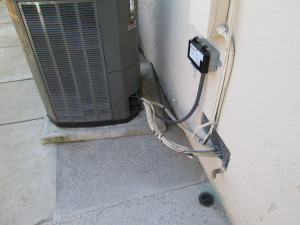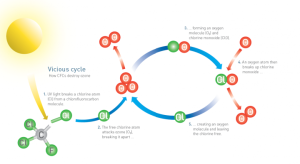When should I replace my air conditioner?
It really depends on how much you use it. If you only turn it on a few days out of a year, then it’s not going to be worth it. If you live in a hot area and use it at least a couple days a week in the summer, then it can be a great investment. If it’s more than 15 years old, consider replacing as AC energy efficiency has taken some big steps in recent years.
Furthermore, a lot of existing units aren’t sized or installed properly (over-sized almost every time). You may not be satisfied with your air quality and temperatures (air temperature should be consistent throughout the house, air should be odorless and crisp, not musty or humid), not to mention your energy bill. A precise calculated amount of air should be supplied to each room based on every room’s specific cooling needs. An old, inefficient unit with a sloppy or degraded duct system will waste energy and provide little comfort. The sooner you invest in a new efficient system, the sooner it will start paying for itself with a lower energy bill.
Can I repair my air conditioner?
It’s a good idea to get it serviced, as the coolant might need a refresher (refrigerant charge verification), or the filter might need cleaning or replacing. Be aware, though: old units that still use R-22 or other types of “freon” have become much more expensive to service than newer units which use R-410A, or “puron.” The EPA is slowly driving up the price of R-22 to encourage people to slowly make the switch.
Will a new air conditioner be better for the environment?
The short answer is yes. Most new units use R-410A, which does not cause ozone depletion, whereas older units use R-22, an extremely harmful CFC (see below). Furthermore, a newer unit should be more energy efficient (SEER rating), ideally. Of course, there’s a trade-off. It takes materials and resources to build the new unit. The old unit, although stripped and recycled for the most part, still involves some waste. Bottom line, here’s the rule of thumb:
- Do not Replace if: You use your AC once a week or less for only a few months out of the year.
- Replace if: a) You use it more frequently than described above, b) its 15 years old at least, or c) you need to service the AC and pay your AC repair man for more expensive ozone depleting R-22 refrigerant.
What are CFCs?
Chlorofluorocarbons are compounds containing carbon, fluorine, and chlorine, which, when released into the upper atmosphere, are exposed to more wavelengths of sunlight, causing the compound to split and release a chlorine ion. The chlorine ion (Cl-) then reacts with ozone in a frighteningly destructive manner. The chemical reaction is actually an endless cycle, where the chlorine ion is released again at the end of the 2-stage reaction, free to find and break down another ozone atom. A single chlorine ion can continuously break down ozone almost indefinitely, or until it is removed from the system by another reaction.
Fortunately, CFCs are gradually being phased out, since the Montreal Protocol. Replacing any appliance still using the old types of coolant will help speed up the process! The three main contributors are home ACs, vehicle ACs, and refrigerators.
When should I replace my refrigerator?
Like air conditioners, older refrigerators used a harmful coolant, R-12, which also causes ozone depletion. R-12 was banned in 1994, but many of these old fridges are still in use. If your refrigerator was made in 1993 or earlier, it’s definitely time to replace it. Besides the coolant issue, if your refrigerator is this old, it will be very difficult and/or expensive to repair. Also, an inefficient or faulty fridge can run up $150 or more in energy costs annually. New efficient units can drop that number to around $50.
Then again, if you have a refrigerator made in, say, the late 90s, which uses the eco-friendly coolant, maintenance and repair might be a better option for now. Lots of little things can go wrong, particularly in fridges with ice-makers. Sometimes a cheap fix will clear it up, and you can avoid dropping a load of cash on a new unit. Also, disposing of the old fridge is quite a chore, and adds a big chunk to our ever-growing ecological footprint.
How do I repair my refrigerator?
A few tips and tricks you can do yourself before calling a repair guy:
If you’re getting pools of water in the bottom of the fridge, it’s usually a sign of clogged drainage pipes, and you probably just need a defrost. Store your food in coolers and unplug your fridge for at least 24 hours. It is also recommended that you clean the condenser coil (and this is a good time to do it). But if you’re going into the inner workings of your refrigerator, be aware that capacitors store power and can be dangerous even when the whole thing is unplugged.
If your fridge has completely stopped working, the first step is to check the power. You can try unplugging the fridge, waiting a minute, and plugging it back in. If this doesn’t work, unplug it again and check the circuit breaker to see if it was tripped. Switch it back on if needed and use a smaller appliance to see if the outlet has power. If none of this works, you will probably have to make a call.
Click here to read more about Efficient Air Conditioning
Get in contact:
[dropshadowbox align=”none” effect=”lifted-both” width=”640px” height=”” background_color=”#ffffff” border_width=”1″ border_color=”#dddddd” ]For more information about Efficient Air Conditioning, call (925) 363-4498 to speak to a technician or schedule an Energy Assessment. You can also e-mail: info@epbuilders.com[/dropshadowbox]
Read our Testimonials from happy homeowners!
Photos of the variety of Home Performance Services we provide on a weekly basis:
[nggallery id=27]



Speak Your Mind